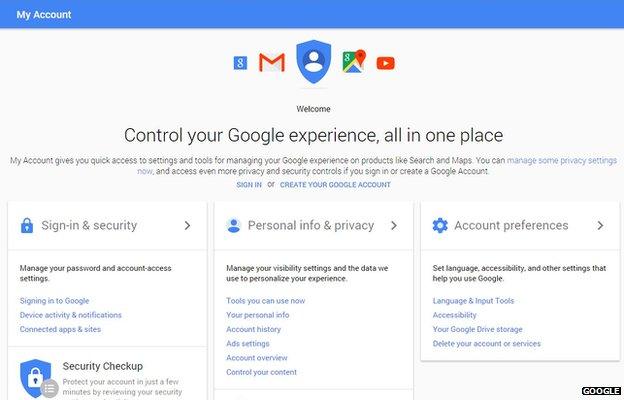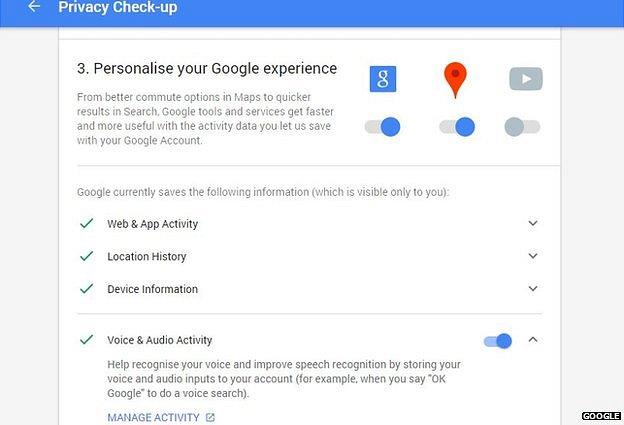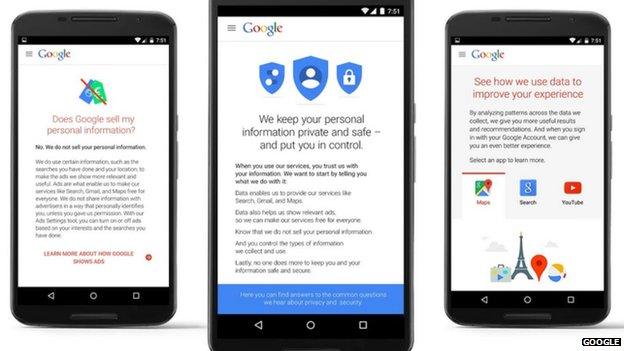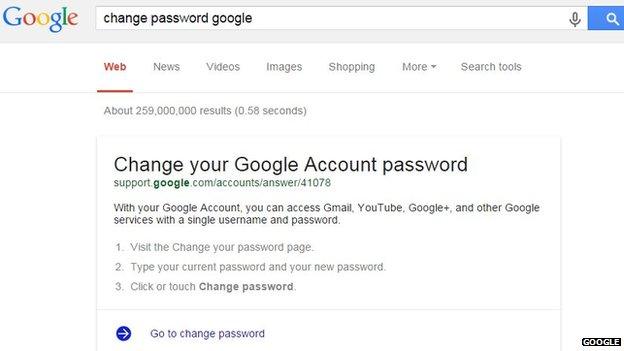Google overhauls privacy and security settings
- Published

The My Account hub brings together settings previously spread over different web pages
Google has pulled all its privacy and security controls into a single hub.
It says the move is designed to make it easier for people to see and control what data is being gathered about them.
Users are still limited to the same choice of settings, but the company says they should find it more "intuitive" to make changes.
One expert said it was a positive development, but suggested some of the language used in the hub's explanatory text represented "spin".
The revamp comes at a time when US tech companied are facing increased scrutiny about how they handle EU citizens' data, which is often stored outside the country in which it is created.
Check-up tool
The new hub is called My Account, and it sub-divides the settings into three sections, whose content is presented in what a spokeswoman described as "plain speak":
sign-in and security - this includes account passwords, whether or not two-step verification is switched on, and details about which of Google's apps and other third-party services have access to the user's data
personal info and privacy - including details of a user's Search and YouTube history - with the ability to delete specific queries, control over what location data is gathered, and the ability to prevent search results and displayed ads from being personalised
account preferences - including language settings and the ability to remove oneself completely from specific Google services, including Gmail, YouTube and the Google+ social network
Google had already offered a "security check-up" tool, but it now adds a second privacy-themed one.
This walks the user through many of the choices contained in the "personal info and privacy" section, providing background information about them.

The Privacy Check-up tool allows users to stop Google collecting certain types of data about them
For example, a user can tell YouTube to stop recording their search history, but they are told that if they let it continue it will make "future searches faster and improve your video recommendations".
The company suggests the whole process should only take about two and a half minutes to complete, and adds that it intends to prompt regular use of the facility via its home page.
"When you trust your personal information with us, you should expect powerful controls that keep it safe and private as well as useful answers to your questions," wrote Google executive Guemmy Kim on the company's blog.
"Today's launches are just the latest in our ongoing efforts to protect you and your information on Google."
He added that links to some sections of the hub would now appear at the top of relevant search results, and that Google had created an FAQ of commonly asked questions about its privacy policies, external.

A new website deals with commonly asked questions about Google's privacy policies
'Sales pitch'
One privacy expert at the University of Oxford's Internet Institute had mixed feelings about the development.
"I think it is a good thing that they are pushing forward these privacy settings with more centralised access, and letting them show up in search results," said Dr Joss Wright.
"But looking at how the choices are presented, they could be far more neutral. The tone is very negative, saying, 'You can do this, but why would you ever want to, you'll just be making the world worse for yourself.'
"Everything is given a pro-data-gathering spin. My concern is that it comes across as a sales pitch.
"The entire thing is about convincing people to turn these settings on rather than off, which is only to be expected from Google as that's its business model."

Google's Search tool now directs users to relevant parts of the hub
The campaign group Privacy International has also raised concerns.
"We cautiously welcome the step that Google has taken today. At long last, it is being more forthcoming with users about the information Google retains about them," said Dr Richard Tynan.
"However, the statement and tools seem limited only to information associated with an individual's account.
"It remains to be seen whether Google will be transparent with all the people it collects information on, whether signed in as a user or not, about exactly what information Google collects about them, what can be done with it and how we can discover the totality of information held about our daily lives and interests."
- Published28 May 2015

- Published28 May 2015

- Published27 May 2015
